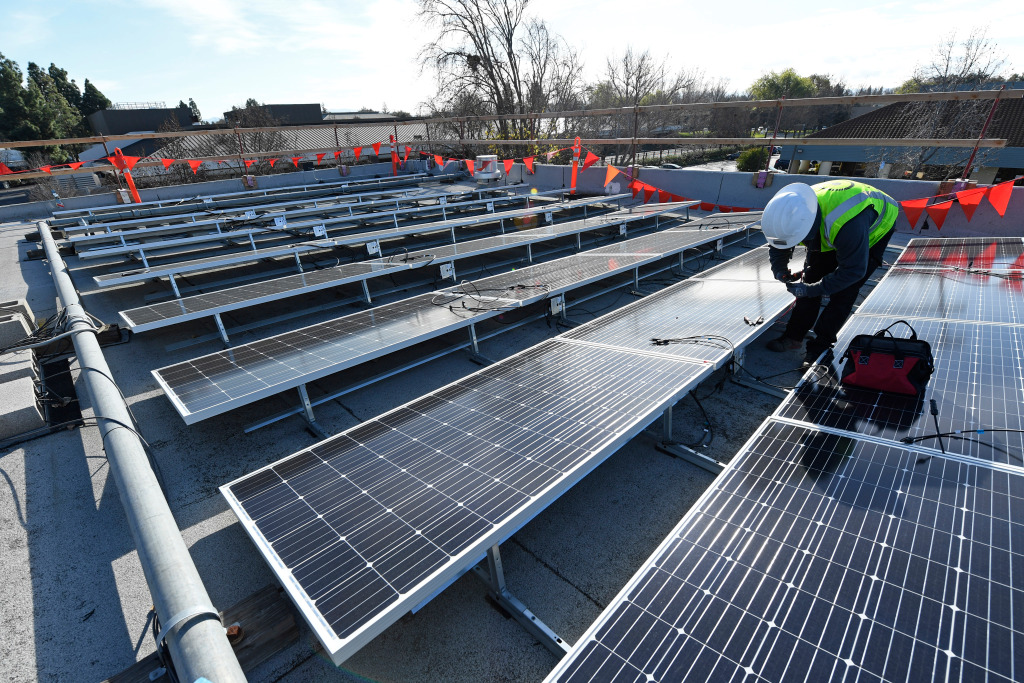ALAMEDA COUNTY — A project to build a 410-acre solar farm on agricultural land north of Livermore just lost a portion of its proposed property, when the landowners backed out of the deal after they were “induced” to sign a document under certain promises, their attorney said.
The attorney for property owners Leland and Mary Stanley sent a “cease and desist” letter to Intersect Power, of San Francisco, ending any negotiations and effectively removing a portion of the couple’s 100-acre property from what had been a 410-acre project located about 2.5 miles north of Livermore on unincorporated land. Of those 100 acres, 38 were to be used for the development of the solar farm.
If approved, the project and another nearby 81-acre solar farm proposed by Oakland’s SunWalker Energy are expected to provide enough power for up to 25,000 homes and businesses. But opponents of the projects want Alameda County to put the two proposals on hold until the county develops a policy for large-scale solar projects, including where and if they should be allowed.
Intersect Power, the company behind the 410-acre Aramis Renewable Energy Project, said in a statement it does not think removal of the 38-acre Stanley property will affect its overall project.
“We do not anticipate this removal will impact our application to construct the Aramis Renewable Energy Project, or jeopardize it in any way,” said Marisa Mitchell, principal of Intersect Power, in a statement.
“Since a lease agreement was never in place with the Stanley family, Intersect Power knew their property may not be included in the project. Not having this smaller site is an economic impact; however, the project is absolutely still viable without it and we look forward to delivering clean, reliable power to Livermore and Bay Area residents soon,” she continued in an email statement.
Opponents of the solar farm claim Intersect is now flipping its script. The company has maintained in the past that it needs all 410 acres to be economically viable, or profitable, said attorney Robert Selna, who represents the grassroots Save North Livermore Valley group, which has been vocal in opposing the project.
In an email Mitchell sent to the county in April, obtained by Save North Livermore via a public records request and provided to this newspaper, Mitchell says that if the county were to reduce the size of the project, “It’s very likely this project will not be built if we lose 45 acres.” The email is referring to a potential reduction in the size of the farm because of any required setbacks. She writes that the project would be “far less economic” and Intersect would have to buy more land to fit the necessary panels on the site.
Opponents also accuse the company of using strong-arm tactics. According to a letter sent from the Stanleys’ attorneys, representatives of Intersect visited the Stanleys’ home for five hours, going over their lease agreement.
“Perhaps most horrifying,” the letter reads, Aramis sent the Stanleys a document ready to sign, with a cash bonus of $75,000 if they signed before Christmas, $25,000 if they signed between Dec. 25 and Jan. 4 and $5,000 between Jan. 5 to 12.
The Stanleys are approaching their 70s, and the Stanley family has been ranching and farming in Livermore since the town was founded in 1869. In a Jan. 11 letter to the county clarifying that the Stanleys will no longer be in negotiations with the solar company, attorney Jacqueline Phillips wrote that Intersect made “representations and promises” to her clients to induce them to sign.
Alameda County supervisors are expected to next month consider an appeal of the project, which was approved by the East County Board of Zoning Adjustments in November. The project was appealed by three groups — Save North Livermore Valley, Friends of Livermore, and Friends of the Vineyard and Open Space.
One of the main concerns of the opponents is related to Measure D, approved by Alameda County voters in 2000 and which established the “urban growth boundary” in part of the county. The measure restricts development to prevent sprawl from reaching eastern Alameda County and protect agriculture, open space and wildlife. The appeal maintains that the project violates this measure in various ways: Industrial solar is not compatible with agriculture, it says, and points out that Measure D makes clear that any future changes in allowable uses require a vote of the people.
Instead, they would like to see the county move forward with a moratorium on solar farms, and establish a policy on commercial solar projects. In September, Supervisors Scott Haggerty and Nate Miley agreed the county needed a clear policy on large solar projects and where they could be located. They also asked the county staff to craft a policy for the full board to consider later. But, they did not recommend stopping the two Livermore projects at the time.
Newly elected Supervisor David Haubert, who replaced Haggerty and whose district includes this land, is said to have promised a moratorium on new solar plants on agricultural land until the county completes a study on the appropriate scale and operation of solar power plans, according to Save North Livermore Valley. Haubert, and his opponent, Vinnie Bacon, agreed to support a moratorium in October when both were running for the District 1 seat.
Haubert’s position, if he stands by it, could put the project on hold until such a study was completed. Haubert could not be reached for comment.











